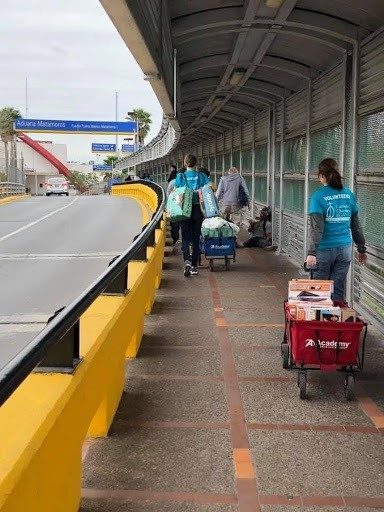
Image: Volunteers bringing supplies over the border to asylum-seekers.
Yesterday, March 11th 2020, the Supreme Court of the United States upheld Trump’s policy of forcing asylum-seekers to remain on the Mexican side of the border during their months- or years-long wait for asylum hearings. Officially known as “Migrant Protection Protocol,” this approach in fact further endangers migrants by denying them the human necessities and services—not to mention rights—that they so fundamentally deserve. In January of this year, the St. Joseph Worker program provided me with the chance to witness MPP’s impact first-hand by visiting the Brownsville/Matamoros port of entry. The following is my attempt to testify to the experience.
I already know how the lines work from my first time returning to the U.S. over the bridge. On the right, a mix of U.S. citizens without passports, folks with work visas and “huddled masses” hoping for asylum hearings. This line is long, close to the entire length of the bridge. It’s slow to move, as though its members are apprehensive about having to plead their cases without legal representation or even a translator (or, more practically, as though this is just how long the backlog is). To the left, a much shorter, quicker line for those of us with little blue booklets. This is the order of things.
Suddenly, the order is broken by a third line of people. It moves against our northward current, bound for the Mexican side. Where the other lines hold people of all genders, ages and manners of dress, this new line consists entirely of men in identical off-white clothing. They carry laundry bags. Their shoes do not have laces. There aren’t all that many of them, fewer than 20, I’d say, so decorum is quickly restored. Everybody back in their place, where they belong.
We all have places we belong. On the parched land where nothing grows anymore; in the crossfire of weapons made in the U.S.; in the jungle, surrounded by slightly less death than surrounded you in what used to be your home. In the fracking executive’s office; in the Super Bowl skybox; on the Senate floor, pushing through genocidal policies. On one side of the border or the other.
None of us are supposed to move from our assigned seat, no matter how splintered the chair—but our punishments aren’t equal. If I left my place, I’d hold myself up for a dozen hours and miss dinner, probably ruin my travel buddies’ plans for the evening. If the woman to my right stepped out of line, she could be separated from her son. But what would happen if we both did, or if we all did, every single soul on this bridge? If we pooled our resources and strategized and sang in that defiant chorus, “The people! United! Will never be defeated!”… even then, the authorities would easily be able to arrest all of us.
Unless they left their spots, too.
And it’s just a wild daydream, I know. I do in fact understand the difference between fantasy and reality. In reality, there aren’t nearly enough air mattresses for everybody in the camp. In reality, mothers sit sentry over their children after dark. In reality, those most to blame for this suffering will never have to confront what they’ve done. And in reality, the only thing more impossible than having made it here is the prospect of going back.
Forgive me, please, for preferring the daydream. For craving that future where we stop pretending that these lines we’re standing in lead to justice, because they don’t. I know from my last time being here that they lead to very mundane, very normal doors. Average size, standard materials.
Ordinary.
The injustice and malice of this situation has been purposefully constructed for over half a millenium. It’s physically present in the landscape; in the high-rises, in the rising seas. So while yes, we must change hearts and minds, we also have a duty to literally change the landscape. If we actually want to make a difference we have to act. To abandon our places in line, even though we’ve been promised that staying where we are will ensure us comfort and stability, even though we don’t know what will happen as a result. From where I’m at, though? I see a whole lot more cruelty than I do comfort, and the only stable thing in sight is an existential precarity. I can’t promise that much good will come from stepping out of line, but I’m certain that nothing good will come from staying in it.
And I know we’ve got the best odds if we all act together.
By Bridget Peterson, St. Joseph Worker
